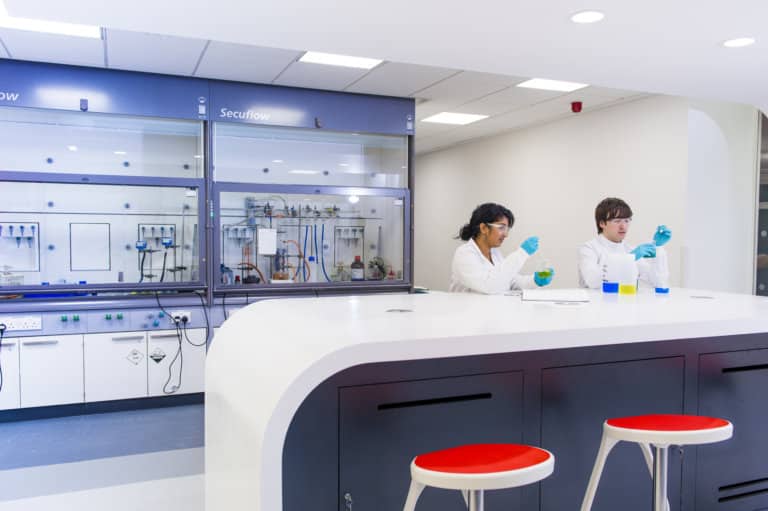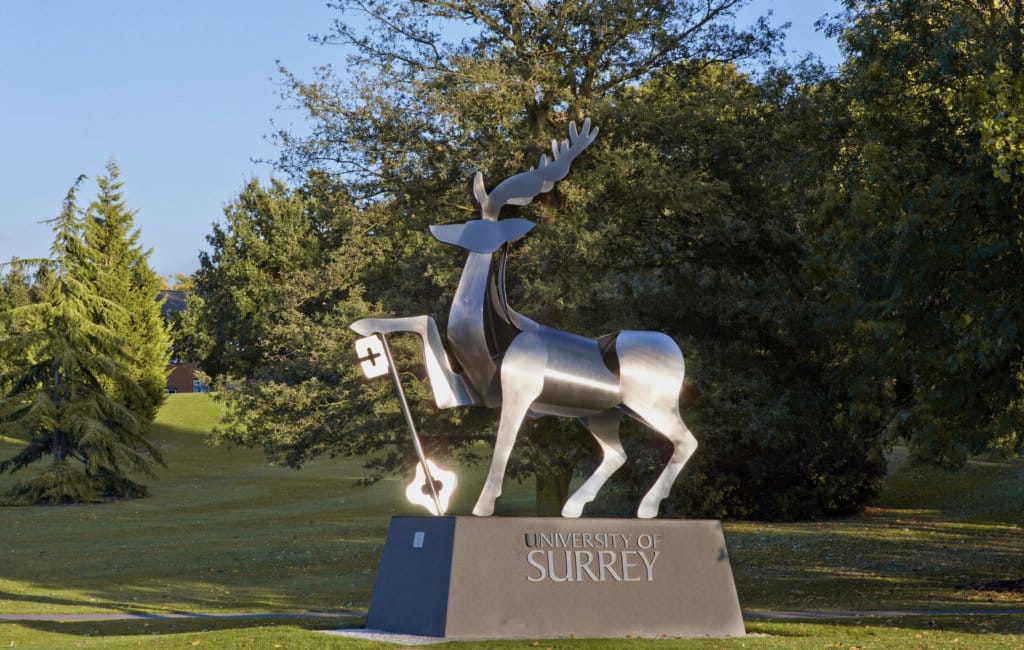
If there’s one thing the world needs, it is more female leaders in science, technology, engineering, and mathematics (STEM). In the UK, one million women were working in core STEM jobs in 2020 — the first time ever. But this figure masks how they are severely underrepresented. Only 24% of the STEM workforce are women.
Although over 50% of females aged 11 to 30 say they were interested in a STEM career, it’s tough for them to realise this goal if they do not have a visible role model.
The best UK universities, however, understand this reality — and provide the people and opportunities that ensure girls can evolve into women STEM students and future leaders.
University of Surrey

Source: University of Surrey
Nestled in Guildford, Surrey and close to London is the University of Surrey, where students are highly satisfied and programmes rank in the top 20 in league tables.
These include the Chemistry BSc (Hons) or MChem degree and the Chemical Engineering BEng (Hons) or MEng degree. Offered by the small and friendly School of Chemistry and Chemical Engineering, the programmes boast one of the best staff-to-student ratios in the country, with 92.5% of students saying that they are satisfied with their course in the National Student Survey 2022. Add excellent facilities like their unique 1.7 million pounds Fluor pilot plant, the Personal Tutor Scheme with timetabled 1-1 time every week, and a “learning by doing” approach with their pioneer training year, Surrey students have all they need to succeed.
And most do — women, especially. Surrey has championed female presence in the STEM fields since its inception in 1966. Almost half of the lecturers are women — making access to opportunities easier for the average female student. Most academics here are relatively young too, making them even more approachable and relatable.
PhD candidate, Shailza Saini, can attest to this: “Only two months after arriving in Surrey, I joined the Women in Engineering society, participated in a sustainability event, and volunteered for one of the University Open Days. Surrey is so diverse and vibrant and as a students’ well-being ambassador, I can tell you that regardless of your background, gender, race and disability, you are welcome here!”
Heriot-Watt University

Experience the best of specialist, pioneering education at Heriot Watt University. Source: Heriot-Watt University, Facebook
Experience the best of specialist, pioneering education at Heriot Watt University. Source: Heriot-Watt University, Facebook
Heriot-Watt University has been around since 1821, but don’t let that fool you. This 200-year-old university is at the forefront of constant change. The institution is valued for its pioneering research informed by the global needs of business and industries. Numbers prove this: 86.8% of Heriot-Watt University research is ranked as world-leading and of international excellence.
From discovery to application, research done at Heriot-Watt by award-winning faculty members as well as students deliver results with global impact. Professor Helen Hastie, for example, is leading the UKRI Trustworthy Autonomous Systems (TAS) Node in Trust. The ultimate goal is for such systems to learn situations where trust is typically lost, adapting this prediction for specific people and contexts. This means that they can be adopted in scenarios never before thought possible, such as doing jobs that endanger humans.
How do they succeed in encouraging such innovative female researchers? By ensuring equal access to funding and resources for their projects. Heriot-Watt University spares no expense when it comes grants — it took a whopping 22.4 million pounds to build The National Robotarium, the UK’s latest centre for robotics and artificial intelligence (AI). This advanced applied research facility eventually became an innovation hub for the practical application of robotics and autonomous systems.
University of Manchester

Today, more female students are making waves in this school than ever before. Source: University of Manchester
The University of Manchester’s School of Engineering develops engineering solutions to make ethical and sustainable improvements to society. They do this in two ways: excellent research and teaching in science-based engineering. Everyone is welcome to join.
“Our diverse body of engineering staff and students work together to help reshape the world, developing skills in everything from robotics, green processing and artificial intelligence, to healthcare technologies, low-carbon infrastructure and digital engineering,” says Professor Alice Larkin, head of the School of Engineering. “We are proud to foster a sense of curiosity, creativity and innovation to address real world problems.”
Four departments make up the school: the Department of Chemical Engineering and Analytical Science; the Department of Computer Science; the Department of Electrical and Electronic Engineering; and the Department of Mechanical, Aerospace and Civil Engineering.
Collectively, they collaborate with the university’s School of Natural Sciences to further develop engineers and scientists who are technically strong, analytically innovative, and creative.
Today, more female students are making waves in the school than ever before –– at both Undergraduate and postgraduate levels. They arrive at the university ready to be taught and nurtured by an inspiring group of female staffers when they aren’t benefiting from the School of Engineering’s award-winning peer-to-peer mentor scheme.
Bangor University

Students here get to apply their knowledge in computer and networking laboratories. Source: Bangor University
Students here get to apply their knowledge in computer and networking laboratories. Source: Bangor University
Bangor University’s School of Computer Science and Electronic Engineering presents several opportunities for students to learn more about the latest developments in computing and electronic technologies. Facilitating this growth is a wide range of courses taught by world leaders in an even broader range of technologies.
These courses are accredited by professional bodies like the British Computer Society and the Institution of Engineering and Technology. Additionally, the school ranked among the top 10 this year for student satisfaction in the UK. It has also achieved the TEF Gold standard in teaching excellence in 2017.
When it comes to research, the theme of excellence persists. From AI and pattern recognition to data visualisation; medical microwave electronics and medical simulation; optoelectronics, broadband and optical communications –– amongst many more –– students undertake their individual and team projects in close collaboration with their mentors who double as professors.
Students also get to apply their knowledge in computer and networking laboratories, a state-of-the art electronic laboratory, extensive research laboratories and a Class 1000 electronics cleanroom.
It’s an experience open to all, and Bangor has the recognition to prove it. Last year, the school was awarded the Athena SWAN Bronze Award for its ongoing commitment to gender equality among staff and students.
*Some of the institutions featured in this article are commercial partners of Study International









